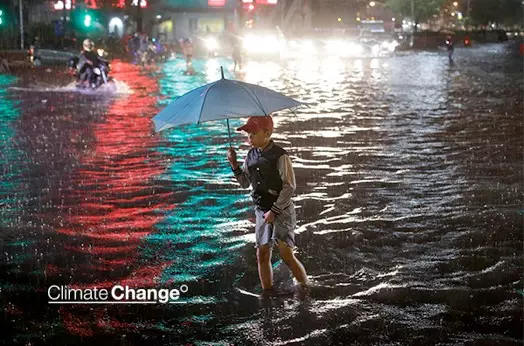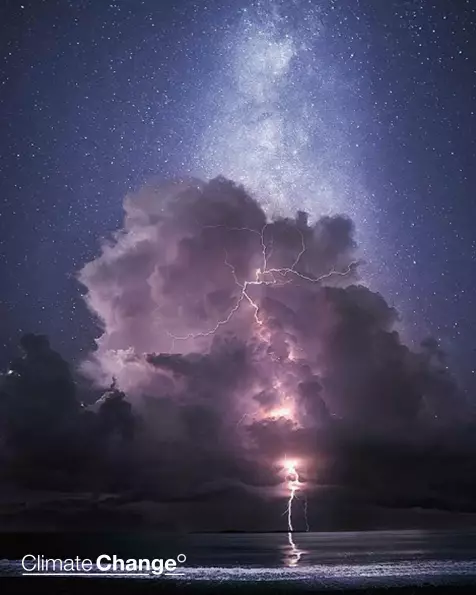
In 2008, the
United Nations' then Deputy High Commissioner for Refugees, L. Craig Johnstone,
said that up to 250 million people
would be displaced by the middle of this century as a result of
extreme weather conditions, dwindling water reserves and a degradation of
agricultural land due to climate change.
The remarks were notable, not just because they showed the devastating potential impact that climate change has to cause in human terms, but also because it showed how the effects of CO2 emissions on global temperatures could create refugee crises similar to those caused by war, famine and disease.
We are all aware of climate change and what its effect will mean for our future, but often it seems something that will not impact on us directly or that has not hit us yet. Recent polling found only 59 percent of us agree that climate change is human caused. Counter to scientific research, deniers continue to write off heatwaves and flooding as anomalies.
Advert
But predicted increases in migration would require us all to face up to the impact of climate change, as well as raising moral concerns about our obligation to the migrants. After all, if our carbon emissions are in part to blame for somebody's displacement, is it not our responsibility to find them a home?
As Andy Challinor, Professor of Climate Impacts at Leeds University, tells me, we are already seeing the impact of climate change across the globe. However, although an average of 22.5 million people have been displaced by climate or weather-related events since 2008, it remains hard to single out any standalone event as being caused directly by climate change.
"The problem is that you can't look at one event and say that event is climate change 100 percent," says professor Challinor. "Essentially it's like loading the dice; climate change makes it more likely you'll see extreme events.

Image Credit: @Cameroncolville
Advert
"But it's also the impact of those events on the availability of food. If there's a failure of food supply in countries that aren't buffered by their relative wealth, and you have a number of these events, then it can lead to unrest and migration."
Droughts, floods, heatwaves - these are the kinds of extreme weather events that are capable of forcing populations to flee their homes. Professor Challinor's research has focused on climate change and the breeding of crops in Africa, a continent predicted to suffer heavily from the continued effects of rising global temperatures. He has found that climate change is outpacing crop breeding, meaning that in the future farmers will produce less food than anticipated.
"At the moment it isn't a disaster, but you could say from the perspective of my research that we're already beginning to lose the battle with climate change," he says. "It'll get harder and harder to match our crops to the environment in which we're growing them. We're having to constantly adjust and keep up, and that's a big challenge."
Droughts thought to have been influenced by climate change are already leading to migration in countries across Africa. In 2015, Angola, Botswana, Malawi, Namibia, South Africa, and Zimbabwe experienced extreme droughts which had a large impact on both staple foods and cash crops. This caused migration from rural to urban areas and across borders.
Advert
And big business is already taking steps to prepare for these extreme events. A report issued in 2015 by insurance firm Lloyds of London titled 'Food System Shock' outlined how an extreme shock to global food production could cause rioting, terrorist attacks, civil war, mass starvation and severe losses to the global economy.
When I speak to professor Piers Forster, the Director of the Priestley International Centre for Climate and a former co-recipient of the Nobel Peace Prize, about his research on African migration patterns he tells me that as well as climate change, the chances of mass migration from an area is also reliant on the political management of natural disasters.

Image Credit: @Jurrry
Advert
"It's quite hard to explain the effects of climate change on migration, because it has a lot to do with the political persuasions of these countries," says professor Forster. "But there could potentially be a 'perfect storm' type situation, where a very bad political situation combines with the effect of climate change, which could really be bad. So it's certainly possible we could see a refugee crisis as a result of climate change in the future, but it's still too early to tell yet."
We have already seen climate change playing a role in geopolitical conflicts. It was suggested that the 'Arab Spring' of 2011 was in part triggered by a severe climate-fuelled drought that hit Syria in the years before the uprising. This drove many rural Syrians into nearby cities, creating unrest and tensions.
Professor Forster's research on migration patterns in Malawi has suggested that those living in rural communities would be less likely to move, as migration requires a level of affluence they do not have. He thinks mass migration is more likely from urban populations in cities which are hit by natural disasters.
"There are a few things linked to climate change that could lead to migration," says professor Forster. "The first is flooding and the other thing is that urban populations are reliant on getting their agriculture crop from a very wide area. But if that supply was disrupted then that's when we'll see large-scale migration."
Advert
It is not just the changes in environment that could lead to migration, but also poverty in tropic countries. Whereas Western countries would be able to respond to the shock to global food production by paying more for importing food, countries in the tropics would likely suffer a scarcity of resources which could trigger humanitarian crises.
But preventing these events means countries are working together now to tackle climate change. Following on from the 1997 Kyoto agreement, earlier this year the 'Paris Agreement' was negotiated. Representatives of 195 countries came together to sign the world's first comprehensive agreement to tackle climate change.
It will take decades to see the impact of these carbon emission reductions, however, it is hoped that over time we can work to prevent and reduce the amount of forced migrations and shock events caused by climate change. Hopefully, as Ban Ki-moon, United Nations Secretary-General, has previously said: "Together we can build a world we want, a world we're proud to leave our children and grandchildren."
Featured Image Credit: PA Images
This week we are taking a look at the causes and effects on our planet with our Climate Change editorial initiative. Read more here:
Climate Change: A Look At The Causes And Effects On Our Planet
Myth vs. Truth: What's Really Happening With Climate Change?
The Shocking Impact Of Climate Change: Before And After
How Climate Change Can Affect Anxiety
We're also partnering with National Geographic to live stream Leonardo DiCaprio and Fisher Stevens' environmental film, Before The Flood, on TheLADbible's Facebook channel and LADbible.com on Sunday 30th October at 9pm GMT. Check out more information.
Climate Change is a crisis for this generation and generations to come. We want to know where you stand on the issue. What can you do? How can we all stop destroying the world? Filling in this poll will help us try to make a difference.
Featured Image Credit:Topics: climate change